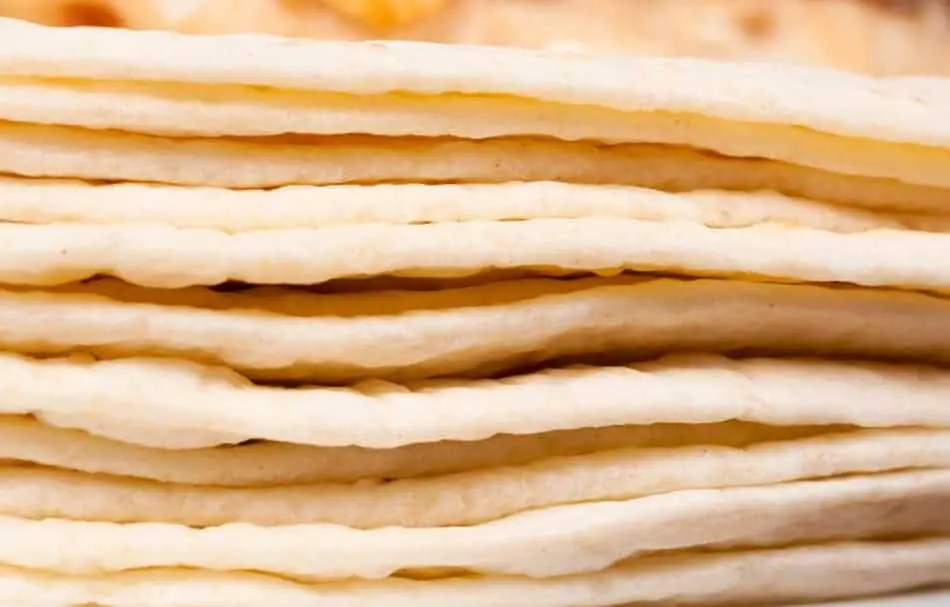In North America, Mexico, and Central America, a corn tortilla is a common type of thin, unleavened flatbread used to make tacos and various wraps. So, these are not to be confused with the arepa, another tasty flatbread made of ground maize dough, popular in South America—specifically, Colombia and Venezuela.
Are they vegan? Yes, most corn tortillas are considered vegan. Recipes vary, but all corn tortillas are some combination of ground maize (white, yellow or black/blue), water, and additives such as plant gums, benzoic acid, and enzymes.
What we’ll do here is go over some of the more common ingredients and why they’re considered vegan, and then list any commercial tortillas on the market that are known to be 100% vegan-friendly.
Why Corn Tortillas Are Generally Considered Vegan
Hominy Flour Is Vegan
The term hominy is used to refer to enlarged kernels of hulled corn with the germ and bran removed. The endosperm—the starchy component—of the white hominy is then soaked in lye and allowed to try which causes the corn to enlarge.
The corn is then treated with an alkalic substance in a process called “nixtamalization” with the pericarp removed—this whole process allows the removal of aflatoxins and other contaminants.1
Upon drying, the corn is then coarsely ground into small particles.2
The hominy flour is then used to make corn tortilla dough, or used for other applications like breakfast grits.
So, no animal products are needed.
What about the dark color of some corn tortillas? No animal products are needed to achieve the dark color characteristic of some corn-based tortillas.
In Guatemala and Mexico, there are actually several types of maize dough used for tortillas: white, yellow, and blue or black.
The darker color seems to be more common in tortilla chips than wraps or shells—blue corn chips are found commercially, usually on the same shelf as the regular potato, corn, and tortilla chips.3
But you will run across darker corn tortillas from time to time. And they are as vegan-friendly as the yellow and white varieties.
Most Corn Tortillas Use Vegan-Friendly Additives
I say most because food manufacturers can get pretty creative in finding ways to throw in non-vegan ingredients, but 99% of the corn tortillas commercially available are free of obvious animal products.
Apparently, this isn’t always the case for made-from-scratch tortillas. There’s been chatter on the Chowhound boards that some Mexican restaurants use lard in their corn tortillas.4
Lard is an animal-based shortening. Namely, hog fat. If it sounds gross, that’s because it is. It’s an ingredient you’ll encounter in some baked goods and pastries, though vegetable shortening seems to be more common these days.
This is a fringe ingredient, and I’ve personally never encountered any corn tortillas with lard in the mix. This is especially true when it comes to commercial corn tortillas. I.e. you never know about the made-from-scratch kind—but, that can be said about anything.
Just know that the default corn tortilla formulation does not include lard. The only fat source you’ll find listed on corn tortilla food labels is partially or fully hydrogenated plant oils, which are always vegan-friendly.
Commercial Vegan Corn Tortillas
Guerrero White Corn Tortillas
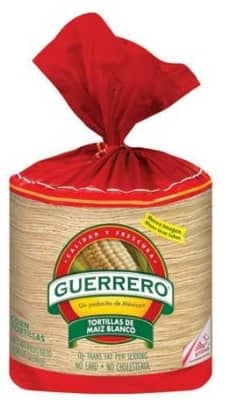
These include:5
- Corn masa flour
- Water
- Cellulose gum
- Propionic and benzoic acid (to preserve freshness)
- Phosphoric acid (another preservative)
- Amylase*
- Guar gum
*I mentioned in the open of the article that enzymes are commonly present in corn tortillas. Enzymes are common in all bread products because they serve several useful functions. There are several enzymes that can be used in bread products, and amylase is among the most common.
Amylases are used in flour to break down complex carbohydrates into shorter chains (dextrins) and sugars.
In tortillas, enzymes like amylases are used to optimize baking properties, improve product quality, and prevent staling caused by chemical and physical changes that take place after baking.6
Anyway, some vegans like to avoid enzymes because many can be sourced from both plants and animals. Amylase can be produced from animals, but it tends to be manufactured microbially via bacteria or fungi.7
The Vegetarian Resource Group (VRG) lists alpha-amylase (the most common in baked goods) as typically vegan.8
While the most prudent of vegans may want to avoid the stuff, products containing and/or processed using amylase are not considered non-vegan by most standards.
La Banderita Yellow Corn Tortillas
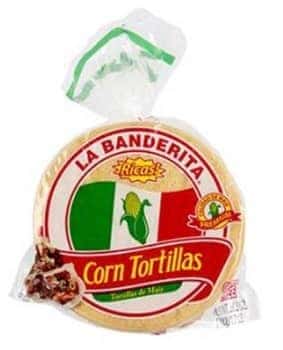
Ingredients for these include:9
- Ground corn treated w/ lime
- Water
- Calcium propionate
- Carboxymethyl cellulose* (to preserve freshness)
- Monocalcium phosphate
- Potassium sorbate (a preservative)
- Fumaric Acid (a dough conditioner)
Carboxymethyl cellulose, or CMC, is another term for cellulose gum, which is an ingredient derived from cellulose—the tough plant matter naturally present in vegetables. Cellulose and its derivatives are always considered vegan.
Mission Extra Thin Yellow Corn Tortillas
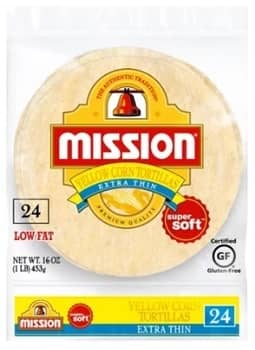
These contain:10
- Ground yellow corn treated with lime
- Water
- Cellulose gum
- Propionic acid (to preserve freshness)
- Benzoic acid (also for freshness)
- Phosphoric acid (a preservative)
- Guar gum*
- Amylase
*Guar gum is a vegetable gum derived from guar beans. It’s used as a thickener and stabilizer in various food products from bread to ice cream. It has properties similar to gelatin, so folks often ask if it’s vegan.
Yes, guar gum is always considered vegan. Again, it’s produced from a bean, so it’s plant-based and thus vegan.
Mission White Corn Tortillas
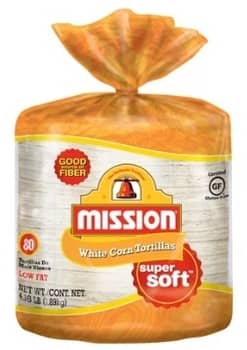
These contain:11
- Ground white corn treated with lime
- Water
- Carboxymethyl cellulose (CMC)
- Propionic and benzoic acids (to preserve freshness)
- Phosphoric acid (a preservative)
- Amylase
- Guar gum
That’s it for the vegan status of corn tortillas. Thanks for reading.
You may also want to check out the following related articles:
References
- Nixtamalization. https://en.wikipedia.org/wiki/Nixtamalization
- Understanding Food: Principles and Preparation (Page 353). Amy Brown – Wadsworth Cengage Learning – 2011
- Understanding Food: Principles and Preparation (Page 352). Amy Brown – Wadsworth Cengage Learning – 2011
- Is Lard Traditional in Corn Tortillas? – General Discussion – https://www.chowhound.com/post/lard-traditional-corn-tortillas-1016316
- Guerrero White Corn Tortillas, 80 Count. https://www.walmart.com/ip/Guerrero-White-Corn-Tortillas-80-Count/12166719
- Bakery Enzymes in Tortilla Applications (Effect of Enzymes on Tortillas). https://www.tortilla-info.com/downloads/Europe%2018/Agha%20-%20Bakery%20Enzymes%20in%20Tortilla%20Applications.pdf
- Amylase. https://en.wikipedia.org/wiki/Amylase#%CE%B1-Amylase
- Questions About Food Ingredients. https://www.vrg.org/nutshell/faqingredients.htm#amylase
- Product Of La Banderita, Yellow Corn Tortillas, Count 1 – Mexican Food / Grab Varieties & Flavors. https://www.instacart.com/giant/products/317322-la-banderita-mini-taco-corn-tortillas-80-ct-45-17-oz
- Mission Extra Thin Yellow Corn Tortillas. https://www.walmart.com/ip/Mission-Extra-Thin-Yellow-Corn-Tortillas-24-Count/10309354
- Mission White Corn Tortillas. https://www.walmart.com/ip/Mission-White-Corn-Tortillas-80-Count/12166959

